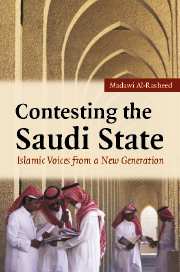Book contents
- Frontmatter
- Contents
- Glossary
- Map
- Introduction: debating religion and politics in the twenty-first century
- 1 Consenting subjects: offcial Wahhabi religio-political discourse
- 2 Re-enchanting politics: Sahwis from contestation to co-optation
- 3 Struggling in the way of God abroad: from localism to transnationalism
- 4 Struggling in the way of God at home: the politics and poetics of jihad
- 5 Debating Salafis: Lewis Atiyat Allah and the jihad obligation
- 6 Searching for the unmediated word of God
- Conclusion
- Notes
- Bibliography
- Index of personal names
- Index of place names
- General Index
- Cambridge Middle East Studies 25
Introduction: debating religion and politics in the twenty-first century
Published online by Cambridge University Press: 22 September 2009
- Frontmatter
- Contents
- Glossary
- Map
- Introduction: debating religion and politics in the twenty-first century
- 1 Consenting subjects: offcial Wahhabi religio-political discourse
- 2 Re-enchanting politics: Sahwis from contestation to co-optation
- 3 Struggling in the way of God abroad: from localism to transnationalism
- 4 Struggling in the way of God at home: the politics and poetics of jihad
- 5 Debating Salafis: Lewis Atiyat Allah and the jihad obligation
- 6 Searching for the unmediated word of God
- Conclusion
- Notes
- Bibliography
- Index of personal names
- Index of place names
- General Index
- Cambridge Middle East Studies 25
Summary
This book is an ethnography of consent and contestation. It is about contemporary Saudis who debate politics and religion. Outsiders often refer to Saudis as Wahhabis or Salafis, but in the twenty-first century Saudis themselves no longer agree on the meaning of these terms and many do not accept their validity. Most Saudis believe that there is no separation between religion and politics at the level of public discourse. Yet the majority agree that in practice there is a separation between the professed religious rhetoric of the state, on the one hand, and the reality of political practice, on the other. Calls for the reformation of state and society always invoke religion and politics together in a single framework. This book focuseson what I call Wahhabi religio-political discourse, the sum total of interpretations that draw on religion to comprehend, justify, sanction or challenge politics. This discourse is rooted in the Wahhabi tradition and the intellectual heritage of its 'ulama. Wahhabi interpretations are the dominant intellectual reference point.
Some scholars claim that authoritarianism generates conceptual impotence. Others argue that authoritarian rule produces development outcomes that are either very good or very bad. In the Saudi case, authoritarianism has generated consenting subjects, incomplete projects, diverted journeys, betrayal and opportunism – but not intellectual impotence. Saudi authoritarianism has led to consent and confrontation at the same time. The regime, together with a mushrooming religious bureaucracy, created a world that insisted on complete submission to political authority while preaching total submission to God.
- Type
- Chapter
- Information
- Contesting the Saudi StateIslamic Voices from a New Generation, pp. 1 - 21Publisher: Cambridge University PressPrint publication year: 2006



